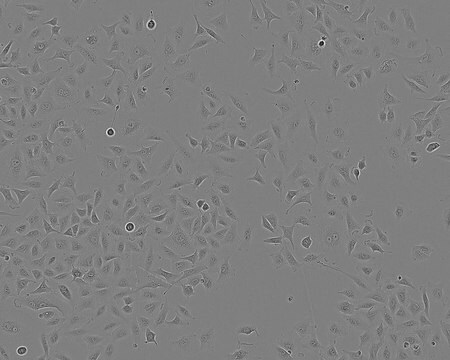Recommended Products
biological source
human lung
growth mode
Aggregates in suspension
karyotype
Aneuploid
morphology
Irregular
products
Not specified
receptors
Not specified
technique(s)
cell culture | mammalian: suitable
relevant disease(s)
cancer
shipped in
dry ice
storage temp.
−196°C
Related Categories
Cell Line Origin
Human lung small cell carcinoma
Cell Line Description
DMS79 has been established from pleural fluid of a patient with small cell carcinoma of the lung. The patient was treated with cytoxan, vincristine, methotrexate and radiation therapy. The cultures show a tendency for the modal chromosome number to decline. The production of adrenocorticotropin (ACTH), bombesin, calcitonin, β-endorphin, 17-β-estradiol, lipotropin, ocytocin-neurophysin, parathyroid hormone and somatstatin-like imuno-reactivity has been reported. The cells have also been reported to have the following cell surface antigens: Leu-7, Class I HLA, Class II HLA, Mg23 defined by the AML-2-23 monoclonal antibody and the AML-1-99 defined antigen. The cells have a receptor for epidermal growth factor (EGF) and produce tumours in nude athymic mice. Cells grow as irregularly shaped aggregates.
Application
Human lung tumour model, carcinogenesis studies.
Culture Medium
RPMI 1640 + 2mM Glutamine + 10% Foetal Bovine Serum (FBS) (Heat Inactivated).
Subculture Routine
Maintain cultures between 3 ? 9 x 100,000 cells/ml; 5% CO2; 37°C. Only dilute 1:2 as a maximum. This cell line grows as clumps in suspension which can be easily dispersed with pipetting. Trypsinisation is not necessary. Routine splitting can therefore
Other Notes
Additional freight & handling charges may be applicable for Asia-Pacific shipments. Please check with your local Customer Service representative for more information.
Certificates of Analysis (COA)
Search for Certificates of Analysis (COA) by entering the products Lot/Batch Number. Lot and Batch Numbers can be found on a product’s label following the words ‘Lot’ or ‘Batch’.
Already Own This Product?
Find documentation for the products that you have recently purchased in the Document Library.
Our team of scientists has experience in all areas of research including Life Science, Material Science, Chemical Synthesis, Chromatography, Analytical and many others.
Contact Technical Service


